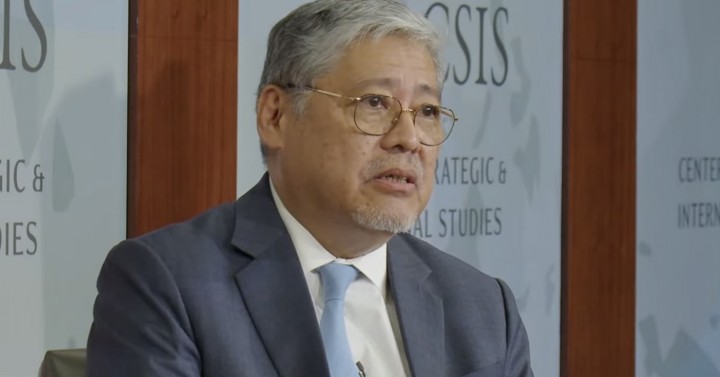The Philippine government, through the Department of Foreign Affairs, has expressed its intent to forge stronger maritime cooperation with Vietnam in the South China Sea, where both countries are claimant states.
DFA Secretary Enrique Manalo revealed this Tuesday in his speech before the Diplomatic Academy of Vietnam.
“Our geographies and status as major littoral and claimant states in the South China Sea make maritime cooperation a vital point of interaction between our two countries, as economic and security partners. As in centuries prior, this body of water connects our peoples, despite some differences,” Manalo said.
“Beyond its strategic significance, the South China Sea is the lifeblood of millions of Filipinos and Vietnamese people who depend on the sea for livelihood,” he added.
Manalo stressed that as maritime nations, the Philippines and Vietnam should prioritize having safe and secure seas and sound marine ecosystems as integral to the future of their citizens and the region.
The DFA official is on a four-day official visit to Vietnam for the 10th Philippines-Vietnam Joint Commission on Bilateral Cooperation, three years after the 9th Philippines-Vietnam JCBC was held in Manila in 2019, attended by then-Foreign Affairs Secretary Teodoro Locsin Jr. and Vietnamese Deputy Prime Minister and Foreign Minister Pham Binh Minh.
Given the previous joint marine research expeditions of the Filipinos and Vietnamese scientists in the 1990s, Manalo said the two countries “must press further on in exploring novel modes of cooperation in maritime safety, search and rescue, marine scientific research, and marine environmental protection.”
“Achieving maritime security is a powerful impetus for our Strategic Partnership. Through the Philippines-Vietnam Joint Permanent Working Group on Maritime and Ocean Concerns, we discuss challenges and explore joint initiatives for the effective management of our competing claims in this area, with the overarching goal of preserving regional peace and stability,” he pointed out.
He also noted that the two nations also benefit from the rules-based order which he described as the “bedrock of peace and prosperity” in the South China Sea, a shipping passage for an estimated $5.3 trillion worth of trade.
“Our Strategic Partnership must affirm that we are invested in keeping the seas open and free for the enjoyment of our peoples and that disputes must be managed and resolved peacefully in accordance with international norms and laws, including the UN Convention on the Law of the Sea as well as the 2016 Arbitral Award on the South China Sea,” he said.
The DFA chief is referring to the 2016 arbitral ruling that favored the Philippines’ claims in the West Philippine Sea, which is part of the larger South China Sea.
However, China, which claims almost the entire South China Sea, continued to ignore the arbitral ruling, and insists on its nine-dash line claim.
In a bid to reinforce its claim in the oil and natural-gas-rich region, the Philippine government started calling that portion of the South China Sea as the West Philippine Sea in 2012.
